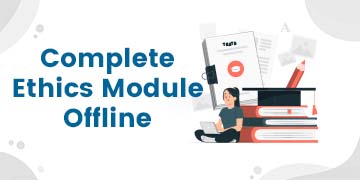
706 1st Floor Dr. Mukherjee Nagar Near Batra Cinema Delhi – 110009
Complete Ethics Module (Offline): A Thorough Overview
Introduction
The Complete Ethics Module (Offline) is designed to equip aspirants with the knowledge and skills necessary for the Ethics, Integrity, and Aptitude paper in the UPSC Civil Services Mains Examination. This paper tests the candidate’s grasp of ethical principles, moral reasoning, and integrity, especially in the context of public service. The course offers structured, in-person learning that covers key ethical concepts, enhances decision-making abilities, and teaches how to apply ethics to practical situations.
Course Objectives
- Thorough Understanding of Ethics: The course focuses on developing a strong foundation in ethics, covering essential concepts such as integrity, emotional intelligence, public service values, and probity.
- Practical Application of Ethical Concepts: Students will learn how to use ethical theories and principles to address case studies and real-life scenarios faced in public administration.
- Improving Ethical Reasoning: Emphasis is placed on building students’ ability to think critically about ethical issues, resolve dilemmas, and maintain moral integrity.
- Enhancing Writing and Presentation: Since the Ethics paper is descriptive, the course helps students improve their ability to clearly articulate ethical arguments and propose solutions.
Course Structure
The Offline Ethics Module includes:
- Core Ethical Concepts:
- Introduction to essential ethical principles, including integrity, transparency, accountability, and impartiality.
- Detailed lessons on emotional intelligence, professional ethics, and public service values.
- Ethical Theories and Philosophers:
- Exploration of ethical frameworks such as utilitarianism, deontology, virtue ethics, and Gandhian philosophy.
- Understanding the relevance of key philosophical ideas in ethical decision-making.
- Case Studies and Practical Examples:
- In-depth analysis of case studies focused on ethical challenges faced by civil servants.
- Role-playing activities to practice ethical decision-making and apply moral reasoning in real-life situations.
- Ethics in Governance:
- Examination of the role of ethics in governance, including topics like corruption, transparency, and accountability.
- Discussions on fostering ethical behavior in public administration.
- Resolving Ethical Dilemmas:
- Tools for addressing ethical dilemmas and handling conflicts of interest in a professional context.
- Techniques to balance personal integrity with public interest while maintaining ethical standards.
- Answer Writing and Presentation:
- Regular practice in crafting descriptive answers for the Ethics paper, focusing on structure and clarity.
- Tips for presenting ethical arguments effectively, using examples, and writing concise yet detailed responses.
- Mock Tests and Feedback:
- Periodic mock tests simulating the Ethics paper to help students gauge their progress.
- Detailed feedback on writing style, ethical reasoning, and presentation skills to support continuous improvement.
Teaching Methods
- Interactive Sessions: Engaging classroom discussions on ethical principles, case studies, and governance issues, encouraging student participation.
- Case Study Approach: Emphasis on resolving case studies through group activities, role-playing, and real-world examples to strengthen understanding.
- Peer Learning and Collaboration: Group activities that foster collaborative learning, allowing students to share perspectives and approaches to ethical challenges.
- Individualized Feedback: Instructors provide personalized guidance and feedback on students’ performance, helping them improve their reasoning and writing skills.
Benefits of Offline Learning
- Structured Learning Environment: Offline classes offer a disciplined approach, helping students stay consistent in their studies.
- Immediate Feedback: Direct interaction with instructors ensures quick doubt resolution and immediate feedback on performance.
- Collaborative Learning: The offline format encourages interaction with peers, promoting a richer learning experience through discussions and group activities.
- Focused Attention: The classroom setting minimizes distractions, enabling students to remain fully engaged throughout the learning process.
Conclusion
The Complete Ethics Module (Offline) is an essential course for candidates preparing for the Ethics, Integrity, and Aptitude paper in the UPSC Civil Services Examination. Covering fundamental ethical concepts, real-life case studies, and ethical theories, the course helps students navigate ethical dilemmas confidently. With regular practice, interactive lessons, and personalized feedback, students gain the tools needed to craft thoughtful and insightful answers, enhancing their performance in the Mains exam.
